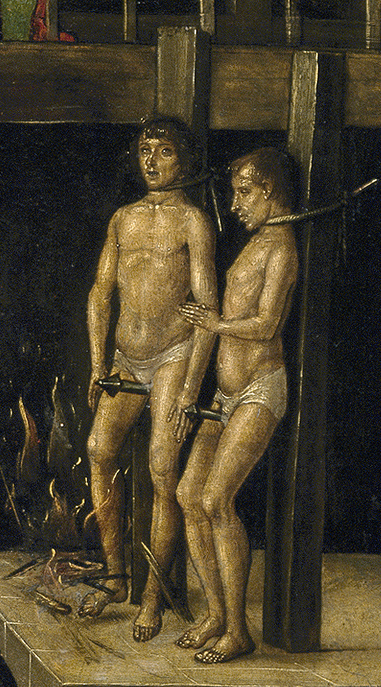|
Humility
Humility is the quality of being humble. The Oxford Dictionary, in its 1998 edition, describes humility as a low self-regard and sense of unworthiness. However, humility involves having an accurate opinion of oneself and expressing oneself modestly as situations demand, with clear goal orientation, openness, broad-mindedness, and a non-imposing mentality. In a religious context, humility can mean a recognition of self about a deity (i.e. God) and subsequent submission to that deity as a religious member. Outside of a religious context, humility is defined as being "unselved"—liberated from the consciousness of self—a form of temperance that is neither having pride (or haughtiness) nor indulging in self-deprecation. Humility refers to a proper sense of self-regard. In contrast, humiliation involves the external imposition of shame on a person. Humility may be misinterpreted as the capacity to endure humiliation through self-denigration. This misconception arises from the co ... [...More Info...] [...Related Items...] OR: [Wikipedia] [Google] [Baidu] [Amazon] |
Wisdom
Wisdom, also known as sapience, is the ability to apply knowledge, experience, and good judgment to navigate life’s complexities. It is often associated with insight, discernment, and ethics in decision-making. Throughout history, wisdom has been regarded as a key virtue in philosophy, religion, and psychology, representing the ability to understand and respond to reality in a balanced and thoughtful manner. Unlike intelligence, which primarily concerns problem-solving and reasoning, wisdom involves a deeper comprehension of human nature, Morality, moral principles, and the long-term consequences of actions. Philosophically, wisdom has been explored by thinkers from Ancient Greece to modern times. Socrates famously equated wisdom with recognizing one’s own ignorance, while Aristotle saw it as practical reasoning (''phronesis'') and deep contemplation (''sophia (wisdom), sophia''). Eastern traditions, such as Confucianism and Buddhism, emphasize wisdom as a form of enlighte ... [...More Info...] [...Related Items...] OR: [Wikipedia] [Google] [Baidu] [Amazon] |
Virtue
A virtue () is a trait of excellence, including traits that may be morality, moral, social, or intellectual. The cultivation and refinement of virtue is held to be the "good of humanity" and thus is Value (ethics), valued as an Telos, end purpose of life or a foundational principle of being. In human practical ethics, a virtue is a disposition to choose actions that succeed in showing high moral standards: doing what is said to be right and avoiding what is wrong in a given field of endeavour, even when doing so may be unnecessary from a utilitarianism, utilitarian perspective. When someone takes pleasure in doing what is right, even when it is difficult or initially unpleasant, they can establish virtue as a habit. Such a person is said to be virtuous through having cultivated such a disposition. The opposite of virtue is vice. Other examples of this notion include the concept of Merit (Buddhism), merit in Asian traditions as well as (Chinese language, Chinese ). Etymology The ... [...More Info...] [...Related Items...] OR: [Wikipedia] [Google] [Baidu] [Amazon] |
Temperance (virtue)
Temperance in its modern use is defined as moderation or voluntary self-restraint. It is typically described in terms of what a person voluntarily refrains from doing. This includes restraint from revenge by practicing mercy and forgiveness, restraint from arrogance by practicing humility and modesty, restraint from excesses such as extravagant luxury or splurging, restraint from overindulgence in food and drink, and restraint from rage or craving by practicing calmness and equanimity. The distinction between temperance and self-control is subtle. A person who exhibits self-control wisely refrains from giving in to unwise desires. A person who exhibits temperance does not have unwise desires in the first place because they have wisely shaped their character in such a way that their desires are proper ones. Aristotle suggested this analogy: An intemperate person is like a city with bad laws; a person who lacks self control is like a city that has good laws on the books but doesn’ ... [...More Info...] [...Related Items...] OR: [Wikipedia] [Google] [Baidu] [Amazon] |
Pride
Pride is a human Emotion, secondary emotion characterized by a sense of satisfaction with one's Identity (philosophy), identity, performance, or accomplishments. It is often considered the opposite of shame or of humility and, depending on context, may be viewed as either virtue or vice. ''Pride'' may refer to a feeling of satisfaction derived from one's own or another's choices and actions, or one's belonging to a group of people. Typically, it is a product of praise, independent self-reflection and/or a fulfilled feeling of belongingness, belonging. The word ''pride'' may refer to group identity manifestations, including one's Racial pride, ethnicity—notably, Black Pride, which gained historical momentum during the U.S. Civil Rights Movement, and earlier independence struggles—Feminist movement, Feminist Pride, rooted in the women's rights movement and gender equality struggles—and Sexual identity, sexual identity (for example, Gay pride, Gay Pride or LGBT Pride, rising ... [...More Info...] [...Related Items...] OR: [Wikipedia] [Google] [Baidu] [Amazon] |
Humiliation
Humiliation is the abasement of pride, which creates mortification or leads to a state of being Humility, humbled or reduced to lowliness or submission. It is an emotion felt by a person whose social status, either by force or willingly, has just decreased. It can be brought about through intimidation, physical or mental mistreatment or trickery, or by embarrassment if a person is revealed to have committed a socially or legally unacceptable act. Whereas humility can be sought alone as a means to de-emphasize the ego, humiliation must involve other person(s), though not necessarily directly or willingly. Humiliation is currently an active research topic, and is now seen as an important – and complex – core dynamic in human Interpersonal relationship, relationships, having implications at intrapersonal, interpersonal, institutional and international levels.Lindner, Evelin, Making Enemies: Humiliation and International Conflict. London, England: Praeger Security Internationa ... [...More Info...] [...Related Items...] OR: [Wikipedia] [Google] [Baidu] [Amazon] |
Epistle Of James
The Epistle of James is a Catholic epistles, general epistle and one of the 21 epistles (didactic letters) in the New Testament. It was written originally in Koine Greek. The epistle aims to reach a wide Jewish audience. It survives in manuscripts from the 3rd century onward and is dated between the mid-1st to mid-2nd century AD. James 1, James 1:1 identifies the author as "James, a servant of God and of the Lord Jesus Christ" who is writing to "the Twelve Tribes of Israel, twelve tribes scattered abroad.” Traditionally, the epistle is attributed to James, brother of Jesus, James the brother of Jesus (James the Just). This has been widely debated, with some early church figures affirming the connection and modern scholars often viewing the letter as Pseudonym, pseudonymous due to its sophisticated Greek language, Greek, possible dependence on later texts, and the lack of evidence for James’ Greek education. During the last decades, the epistle of James has attracted incre ... [...More Info...] [...Related Items...] OR: [Wikipedia] [Google] [Baidu] [Amazon] |
Aidos
Aidos or Aedos (; Greek: , ) was the Greek personification of either shame or modesty. Aidos, as a quality, was that feeling of reverence or shame which restrains men from wrong. It also encompassed the emotion that a rich person might feel in the presence of the impoverished, that their disparity of wealth, whether a matter of luck or merit, was ultimately undeserved. Ancient and Christian humility share common themes: they both reject egotism, self-centeredness, arrogance, and excessive pride; they also recognize human limitations. Aristotle defined it as a middle ground between vanity and cowardice. Mythology She was the last goddess to leave the earth after the Golden Age. She was a close companion of the goddess of vengeance Nemesis. One source calls her daughter of Prometheus. Mythologically, she is often considered to be more of a personification than a physical deity. There are references to her in various early Greek plays, such as ''Prometheus Bound'' by Aeschylus, ... [...More Info...] [...Related Items...] OR: [Wikipedia] [Google] [Baidu] [Amazon] |
Rochdale Unitarian Church "Humility"
Rochdale ( ) is a town in Greater Manchester, England, and the administrative centre of the Metropolitan Borough of Rochdale. In the 2021 Census, the town had a population of 111,261, compared to 223,773 for the wider borough. Rochdale is in the foothills of the South Pennines and lies in the dale (valley) of the River Roch, north-west of Oldham and north-east of Manchester. Rochdale's recorded history begins with an entry in the Domesday Book of 1086 as ''Recedham Manor'', but can be traced back to the 9th century. The ancient parish of Rochdale was a division of the Salford Hundred and one of the larger ecclesiastical parishes in England, comprising several townships. By 1251, the town had become of such importance that it was granted a royal charter. The town became a centre of northern England's woollen trade and, by the early 18th century, was described as being "remarkable for its many wealthy merchants." In the 19th century, it became a mill town and centre for text ... [...More Info...] [...Related Items...] OR: [Wikipedia] [Google] [Baidu] [Amazon] |
Confraternity Of Christian Doctrine, Inc
A confraternity (; ) is generally a Christian voluntary association of laypeople created for the purpose of promoting special works of Christian charity or piety, and approved by the Church hierarchy. They are most common among Catholics, Lutherans, Anglicans, and the Western Orthodox. When a Catholic confraternity has received the authority to aggregate to itself groups erected in other localities, it is called an archconfraternity. Examples include the various confraternities of penitents and the confraternities of the cord, as well as the Confraternity of the Holy Guardian Angels and the Confraternity of the Rosary. Confraternities were "the most sweeping and ubiquitous movement of the central and later Middle Ages". History Pious associations of laymen existed in very ancient times at Constantinople and Alexandria. In France, in the eighth and ninth centuries, the laws of the Carolingians mention confraternities and guilds. But the first confraternity in the modern and pro ... [...More Info...] [...Related Items...] OR: [Wikipedia] [Google] [Baidu] [Amazon] |
Hebrew Bible
The Hebrew Bible or Tanakh (;"Tanach" . '' Random House Webster's Unabridged Dictionary''. ; ; or ), also known in Hebrew as (; ), is the canonical collection of scriptures, comprising the Torah (the five Books of Moses), the Nevi'im (the Books of the Prophets), and the [...More Info...] [...Related Items...] OR: [Wikipedia] [Google] [Baidu] [Amazon] |
Honor
Honour ( Commonwealth English) or honor (American English; see spelling differences) is a quality of a person that is of both social teaching and personal ethos, that manifests itself as a code of conduct, and has various elements such as valour, chivalry, honesty, and compassion. It is an abstract concept entailing a perceived quality of worthiness and respectability that affects both the social standing and the self-evaluation of an individual or of institutions such as a family, school, regiment, or nation. Accordingly, individuals (or institutions) are assigned worth and stature based on the harmony of their actions with a specific code of honour, and with the moral code of the society at large. Samuel Johnson, in his '' A Dictionary of the English Language'' (1755), defined honour as having several senses, the first of which was "nobility of soul, magnanimity, and a scorn of meanness". This sort of honour derives from the perceived virtuous conduct and personal integr ... [...More Info...] [...Related Items...] OR: [Wikipedia] [Google] [Baidu] [Amazon] |








